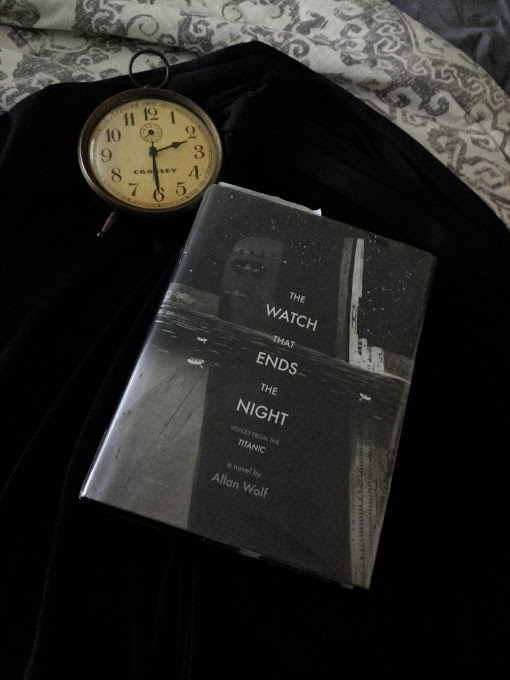
I am starting this project with The Watch that Ends the Night: Voices from the Titanic by Allan Wolf. It is a shocking 430 pages long with a lengthy “Notes” section that addresses everything from source material to a primer on Morse Code.
I came across this book during a project at work. We’ve been systematically pulling every children’s book off the shelf to look up Accelerated Reader levels and points, which are then recorded on a small label on the inside cover, directly across from the barcode we use to check the books in and out. Part of this on-going project requires a good deal of exploration and negotiation: looking for books that don’t have labels and finding a place to put them while we look up the necessary information and log it on a spreadsheet to be printed out on labels. This means that the job is often long and tedious and has a tendency to suck up a lot of what little space we have behind the Children’s Desk at the library…all for the sake of reference and making the customer experience as pain-free as possible.
One of the advantages of this project is that I spend a significant amount of time flipping through the collection, exploring the books that are often left behind for the sake of the new Diary of a Wimpy Kid book or the millionth copy of Harry Potter to be checked out in a week. I’m often in awe at how little attention is paid to the selection of children’s books, particularly by adults. I’m also starting to realize how skewed a library’s circulation can get in the wake of a literary trend. At one point, it was Harry Potter; then it was Percy Jackson; then, it was Diary of a Wimpy Kid and Dork Diaries; next, the popular check-out will be something completely different. My mom calls this the Beanie Baby effect: there’s always a trend that sparks mass hysteria for the briefest of interludes, only to fizzle out months later and become completely worthless in the realm of cultural capital. This is true for Adult Services as well. Patrons browse the new book shelves and look for the most recent Oprah’s Book Club selection or the new hot-ticket title that someone is making a movie out of. Once the movie is made, and the book has been exhausted by all the major news outlets and people start to donate used copies to public libraries and Good Will, it will be forgotten. I guess that’s what differentiates the truly great literary masterpieces from the flash-in-the-pan bestsellers: permanence. But I digress…Let me tell you about this book!
On first approach, I was struck by how much The Watch that Ends the Night is like Edgar Lee Masters’s Spoon River Anthology in that it presents a story of a town or group of people through a series of monologues. In Spoon River’s case, it’s a fictional town presented through the lens of the epitaphs found in the town’s cemetery. In the case of The Watch, it’s poems from the perspectives of actual passengers and crew members on board the Titanic. Jaded though I may be about literary devices and obvious ploying schticks, I was intrigued by this format. In a genre saturated by one-plot narratives, punctuated by dates and times, Mr. Wolf chose to present an all-too-well-known story in a way that suggests a populism to the Titanic that many fail to acknowledge. He depicts a world of characters from JL Smith (captain) all the way down to the resident ship rat and in doing so, calls to mind the fact that most victims of disaster had plans and lives beyond what we know them for. He gives voice to the quiet struggle experienced by the third class passengers, populated by refugees and immigrants while poking holes in the pompous society of first class with routine choruses from the first, second, and third class promenades. These routine choruses sing of the daily life on the Titanic, presenting a kind of social stasis that begins to crumble and fall apart as the iceberg scrapes the side of the ship. Eventually, the chorus degrades into a jumble of desperate voices and the same word in many languages: cold.
More intriguing, however, is the story itself. As one blurb on the book’s back cover ponders, “how do you tell a [story] when you know that everyone knows the ending?” (Helen Frost). An insightful query, to be sure, it gets at the heart of writing powerful historical fiction. Perhaps this is why historical fiction rarely becomes groundbreaking best-sellers. It would have been so easy for Mr. Wolf to package The Watch that Ends the Night as standard, plot driven, dramatic literature. And he didn’t. In truth, the book itself is rather quiet in its delivery. As an older millennial, my first contact with the Titanic was the eponymous film that sparked so much outrage over a simple door. Thus, I approached this book with the expectation of drama, high stakes, and a lightning fast pace. I anticipated hearing screams in my head from page one. And yet, the screams were not the central focus of the book. It was hardly a feature film, more like an experimental play, using little scenery or action, relying heavily on the characters’ words, thoughts, and emotions. At this point, I come to an impasse with myself. The theatre geek in me does backflips at the thought of a staged reading of this book; I’m sure it might be the longest staged reading ever, but intriguing all the same. However, I can’t shake how stilted the book feels as it switches from perspective to perspective, voice to voice. It’s unnerving. Though I wonder if it wasn’t meant to be unnerving in some way, disorienting. But that’s a conversation “serious” literary scholars cannot have, as it broaches the subject of authorial intent, which is verboten and often beside the point.
As I read this book, I kept asking myself if I’d recommend it to my patrons, and I think I might. There’s a bizarre life stage that I see most children go through where they become fascinated by disasters and wars and conspiracies and this book truly appeals to this mindset. However, I feel like maybe this book is a trifle more refined and detailed than most children’s books about disasters, so I think I’ll push it. Who knows, some ambitious kid might like the look of it and get their mind expanded just a bit more. Wouldn’t that be nice?
Current reading list:
Carrie Fisher, The Best Awful.
E.B. White, La toile de Charlotte.
Checked-out because I like to put things on hold when I’m bored:
Herb Boyd (ed), Autobiography of a People: Three centuries of African American history told by those who lived it.
Book that I might end up putting back on my shelf, because I have no time for it and think my brain really isn’t in a place to read it just yet anyway:
Marcel Proust, Swann’s Way.
Advertisements Share this:




